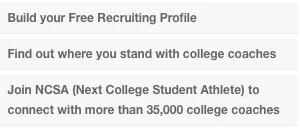Early Enrollees Can Sign as Early as August 1
Football coaches have been clamoring for an earlier signing date and they got it. But much earlier than they may have thought and only for a select group of prospects:
The academic and membership affairs staff determined that a prospective student-athlete who intends to graduate from high school midyear and enroll at a member institution midyear during the same academic year (e.g., spring semester) may sign an institutional financial aid agreement on or after August 1 of his or her senior year, provided the institution issuing the financial aid agreement establishes, prior to issuing the agreement, that the prospective student-athlete is enrolled in all coursework necessary to graduate from high school at midyear.
This applies to all sports but will have the biggest impact on football with the largest number of early enrollees and recruiting of committed prospects. Note that midyear enrollees still cannot sign National Letters of Intent (except for junior college transfers). So the impact may be limited if coaches are unwilling to sign a prospect to a financial aid agreement that locks the university in to providing a scholarship but does nothing to commit the prospect to the university.
Update 1: Many people on Twitter have questioned just how big an impact this will be if the NLI cannot be sent. That may put some coaches off, but my response is to point them to what coaches are already sending to prospects on August 1st as written scholarship offers. These offers, which cannot be accepted and are binding on no one, are already looking like official scholarship agreements or even diplomas. If coaches can send something even more official to prospects, they will.
That said, with the rising number of early enrollees and the push for an earlier signing date, expect many coaches and prospects to take advantage of this opportunity to get at least some commitment down on paper as early as possible.
Update 2: As with any new NCAA rule, one of the first question to ask is what is the loophole, or how can this be abused? The interp only requires that the prospect intend to graduate at midyear and that the institution confirms the prospect is enrolled in the classes required to graduate at midyear. It says nothing about the prospect actually graduating or actually completing those classes. So in theory, a coach could encourage his entire recruiting class to enroll in extra courses so they are on track to graduate early. The prospects could then sign in August, which allows the coaching staff to take advantage of unlimited communication and publicity. If the prospects then drop the courses or fail them, they can still sign NLIs in November or February. Even if the financial aid agreement is invalidated, the institution still bought itself a major recruiting advantage with unlimited communication and the ability to publicize their recruitment of the prospect.


